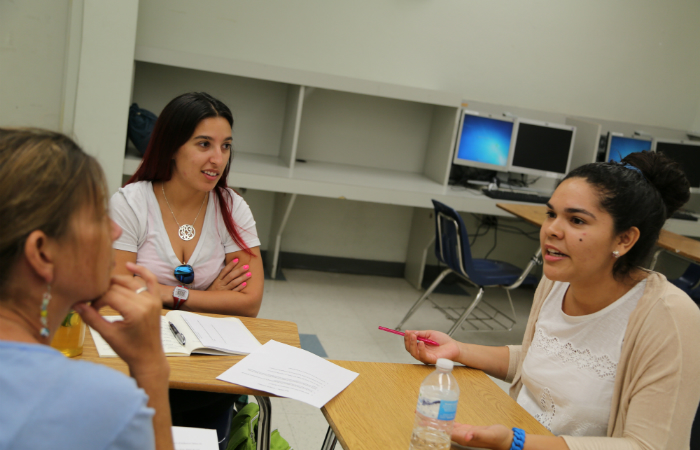
When it comes to preparing tomorrow’s teachers, there’s nothing like getting hands-on practice in Miami’s local schools.
But one College of Education professor took that practice a step further this summer when she moved her course on Teaching Diverse Populations into Miami Northwestern Senior High School.
“After having an experience like this, my students truly recognized the brilliance of these young people who are disenfranchised systemically,” clinical assistant Maria Lovett said. “Now when they go into their classrooms, wherever it is, I think they’ll keep that in mind.”
Miami Northwestern is the site of The Education Effect, a partnership with FIU and Miami-Dade County Public Schools launched in 2011 to improve the educational outcomes of students in Liberty City. In 2014, The Education Effect was expanded to Booker T. Washington Senior High School.
In just four years, The Education Effect has helped improve Miami Northwestern’s chronic D/F school rating to A and B scores from the state, said Lovett who is also the faculty liaison for The Education Effect.
During the summer, Lovett’s students observed, engaged with and learned from Miami Northwestern students who participated in The Algebra Project Summer Institute, founded by historic civil rights advocate Bob Moses and hosted by FIU. Students in the program take classes in algebra, civics and science.
If the goal of The Education Effect was to re-think the way students traditionally learned in public schools, in just three weeks Lovett’s approach has disrupted the way college students learn about being teachers.
Kim Bavuso, an elementary education major, felt uneasy at first about having to travel to the school and a part of town she didn’t know well. After meeting Miami Northwestern’s students for the first time and listening to them speak, her sense of unease wore off.
“I felt really drawn to opening my eyes to what’s going on around me this whole time,” she said. “This class showed me that there are children of all races and all colors that have a lot of potential and just because they’re set up in this environment that makes you overlook them doesn’t mean they should be overlooked because they can contribute just as much as you or I can.”
Two doors down, Erika Williams, 27, an art education major worked with a group of students in a civics class who were making a poster about the life of civil rights activist Ella Baker.
“This is good that we do this before we start our career,” Williams said. “Before, I wouldn’t have considered working in this school, but I might now. It’s cool that she’s doing this because we don’t know much about inner city schools and it opens our eyes to what’s going on. This is quite helpful.”
Leny Ruiz partnered up with three students who chose Moses of The Algebra Project as the subject of their poster and a presentation they would deliver later in the week.
She wasn’t worried so much about working with students from diverse or disenfranchised backgrounds, but rather she was concerned about whether the classroom instruction she received on campus would even be helpful in working with real students.
“I thought it would be a very structured to-do list. This is what you do and this is how you do it,” Ruiz said. “Then we got involved in this project and it was so different from what I expected. It’s not the traditional way of teaching.”
Instead of standing at the front of the class, lecturing to students about the historical figures and dictating what needed to be on the posters, students conducted their own research into Moses and Baker online, and decorated their own posters with the photos and facts they thought were relevant.
“I think the No. 1 thing that happens in classrooms is students feel uncomfortable as well as teachers and that builds a lot of tension which takes away focus from the actual subject,” Ruiz said. “This approach creates a non-threatening environment that’s better and more comfortable because they forget their insecurities.”
In the end, forgetting about insecurities and preconceived beliefs is what Lovett wanted her students to accomplish.
“It’s been an experience,” she said. “There are a lot of misconceptions of Miami Northwestern and Liberty City and stigmas that I wanted to disrupt and I think it’s important for teachers and pre-service teachers to get to know and learn from these kids.”
“It would be amazing if I could teach more classes here and even having more FIU students come and take classes along side Miami Northwestern’s students,” Lovett added.
Tags: Bob Moses × College of Education × Education Effect × Miami Northwestern Senior High School × Office of Engagement × The Algebra Project
This post “Future educators receive hands-on experience teaching diverse students” was originally published on FIU News.

